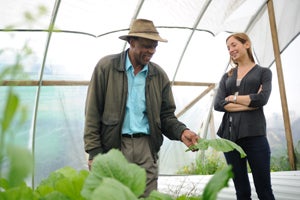With national attention focused on the obesity epidemic and the diabetes crisis—along with rapidly growing concerns about social justice and environmental problems related to the current food-production system—there may be no hotter topic in law schools right now than food law and policy.
And the wildly popular new Harvard Law School Food Law and Policy Clinic, the first law school clinic of its kind in the world, is right at the center, with students working on a wide range of projects to make healthy food more accessible, help farmers’ markets overcome regulatory barriers so they can sell more of their products, guide states and local communities in creating food policy councils, and more.
Phone calls pour in every day from around the country to Emily Broad Leib ’08, Director of the clinic, from state legislators, law students, farmers, and others interested in the cutting-edge work of the clinic. At HLS, there is so much interest that the clinic, a division of the HLS Center for Health Law and Policy Innovation, had a waitlist from the moment it launched in 2010. And demand continues to grow: This year, the clinic took 10 students per semester but there were over 100 students on the waitlist for the clinic or the related classroom course, “Food: A Health Law and Policy Seminar,” co-taught by Broad Leib and HLS Clinical Professor Robert Greenwald, director of the center.
So many students hope to work in this burgeoning area that the clinic, in conjunction with a related student group, the HLS Food Law Society, has published a career guide. And at least 150 people braved a March snowstorm to attend “Forum on Food Labeling: Putting the Label on the Table,” the second annual conference of the Food Law Society, which brought in lawyers, academics, scientists, and others to discuss food labeling regulation and reform.
See related story and watch conference video
“It’s very exciting. We have a lot of students here interested in health, the environment, and social justice issues, and food is at crux of all those,” says Broad Leib, who oversees the student projects, and whose work in the Mississippi Delta led to the creation of the food law clinic.
In 2008, Broad Leib was named the inaugural joint HLS/Mississippi State University Delta Fellow, and moved to the Mississippi Delta, one of the poorest regions in the U.S., to assess its problems and needs. While working on projects related to economic development, the issues of food accessibility, obesity, and health—and the interconnectedness among them—became apparent. Regulatory barriers and tax issues made it difficult for farmers’ markets to succeed, for example, affecting both the supply of fresh fruits and vegetables to consumers and the local economy.
Broad Leib launched a number of projects that provided HLS students with pro bono legal experience in Mississippi, including helping draft six new state laws over the past three years to make healthy food more accessible, especially to low-income people.
She returned to HLS in 2010 to launch the food law and policy clinic under the auspices of the HLS Center for Health Law and Policy Innovation (formerly the Health Law and Policy Clinic). It was a natural fit. The center has long been a national leader in advocating for access to healthcare for low-income people with communicable diseases such as HIV/AIDS. Today, says, Greenwald, “non-communicable disease is becoming an equally urgent crisis. Over the next 10 to 20 years, expenditures related to obesity and diabetes are estimated to skyrocket. We want to make sure we have systems in place to produce healthier foods but that also are sustainable over time, and can truly feed the population.”
The food law and policy clinic currently has 18 projects, and has landed millions of dollars in grants so far to fund its work, including multidisciplinary efforts in conjunction with Harvard’s medical school, school of public health, and business school. With this funding, Broad Leib is overseeing a project in North Carolina and New Jersey on state-level initiatives related to type two diabetes, a training in the Appalachia region on food policy, and an anti-obesity project in Massachusetts to open schools and other public buildings after hours for programming for children. She’s advising the city of Baltimore on ordinances related to food trucks, and she’s been asked to assist the Navajo nation with food-related efforts. “It’s just unbelievable, the amount of demand,” she says.
Rachel Clark ’13 is president of a related student group, the Food Law Society, which offers students the opportunity to work on pro bono projects under the auspices of the clinic, and which has hosted events on such topics as the safety and nutritional value of raw milk. As a student in the clinic, she helped draft legislation in Mississippi, since passed into law, so municipalities can fund farmers’ markets in order to provide more fresh food to consumers. “I want to use food law to make our food system more sustainable,” says Clark, who plans to go into policymaking in the area of food law.
Ona Balkus ’13 was in the clinic throughout her 2L year, and hopes to continue her work in the clinic next year on a fellowship. She came to HLS with a background in nutrition policy, and counts herself “very lucky” that the school offers this program. Food law involves so many areas – from poverty law to corporate law – that it’s a tremendous educational experience to be in the clinic, she says. “What’s really cool about the clinic is you gain a deep understanding of all the different ways you can use law to change the food system.”
